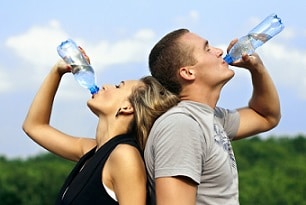 The body is 70% water, and this water has oxygen and electrolytes in it, which the body needs to function. When you sweat, you lose those electrolytes and need to replace them to ensure that the body remains hydrated and all fluids and electrolytes are in balance. This is essential for normal function of our cells and our organs.
The body is 70% water, and this water has oxygen and electrolytes in it, which the body needs to function. When you sweat, you lose those electrolytes and need to replace them to ensure that the body remains hydrated and all fluids and electrolytes are in balance. This is essential for normal function of our cells and our organs.
What are Electrolytes?
Electrolytes are the medical and scientific terminology for salts, specifically ions. The terminology means that the ion is electrically charged and moves to either a positive (anode) electrode or a negative (cathode) electrode. Positive ions are called cations and negative ions are called anions.
Body fluids such as interstitial fluid (fluid between cells), blood and plasma, like seawater, have a high concentration of sodium chloride (table salt, or NaCl), which contains the electrolytes sodium ion (Na+) – cation and chloride ion (Cl-) – anion.
The major electrolytes that can be found in the human body are:
- Bicarbonate (HCO3-)
- Calcium (Ca2+)
- Chloride (Cl-)
- Magnesium (Mg2+)
- Phosphate (PO42-)
- Potassium (K+)
- Sodium (Na+)
- Sulfate (SO42-)
Electrolytes regulate the muscle and nerve functions, blood pressure, blood pH, the body’s hydration, and rebuilding of damaged tissue.
How Sweating Affects Electrolyte Losses
When we sweat we lose body fluids, including electrolytes and when this happens it affects the way our body operates. This is the reason that we must drink water regularly and throughout the day in order to remain hydrated and not put strain on our body, especially the heart.
Even a mild loss of water can significantly impede the body’s performance.For every 1% of body weight we lose, the volume of our blood decreases by 2.5 %; muscle water decreases by 1%, and the body’s core temperature can increase by 0.4 – 0.5° C.
When we do not drink enough water and subsequently get dehydrated, the electrolytes cannot perform the following functions:
- Sodium: Hydrates by maintaining the water balance, activating the thirst response and preventing water intoxication & hyponatremia. It prevents cramping by enabling normal muscle contraction and influences the performance of other minerals. It maintains normal blood pressure and enables nerve impulse transmission.
- Potassium: Potassium also hydrates by maintaining the water balance. It also helps your muscles to use glycogen, their main source of energy, and stimulates the metabolism of carbohydrates and proteins. Potassium prevents muscle fatigue and enables normal muscle contraction.
- Chloride: Maintains water balance and maintains the balance of water in the body. It also energises the body by helping it break down protein and absorb vitamin B12 and minerals. Chloride prevents cramps, and enables normal muscle relaxation and contraction and enables nerve impulse transmission.
- Magnesium: Prevents cramps and decreases pain from sports related injuries, and prevents muscle spasms. It helps the body to convert adenosine triphosphate (ATP) into energy, assists in building protein and stimulates the metabolism of carbohydrates. Magnesium has been proven to have a remarkable impact on athletic performance, blood pressure, heart rate, and oxygen intake.
Unless you drink water regularly your body will not be able to perform any of the above tasks. It is critical that you drink water regularly in order to preserve the balance of ALL electrolytes, thereby maintaining optimal hydration and endurance.
Source:
Rent water coolers in London and buy water coolers online from Living-Water. Get bottled water coolers and mains fed water coolers for the home or office.





